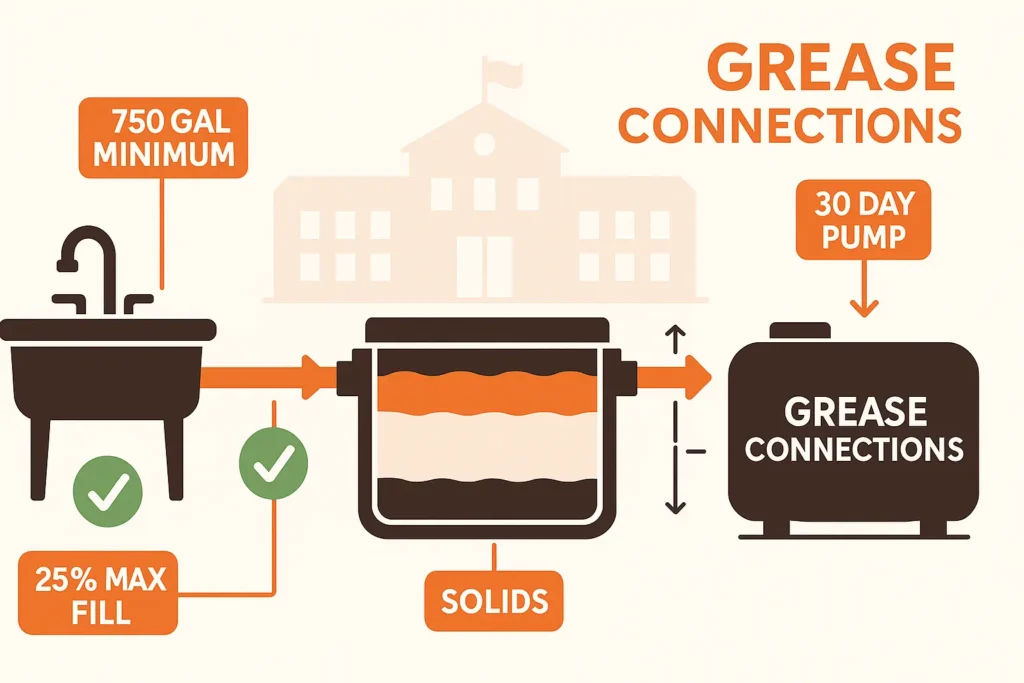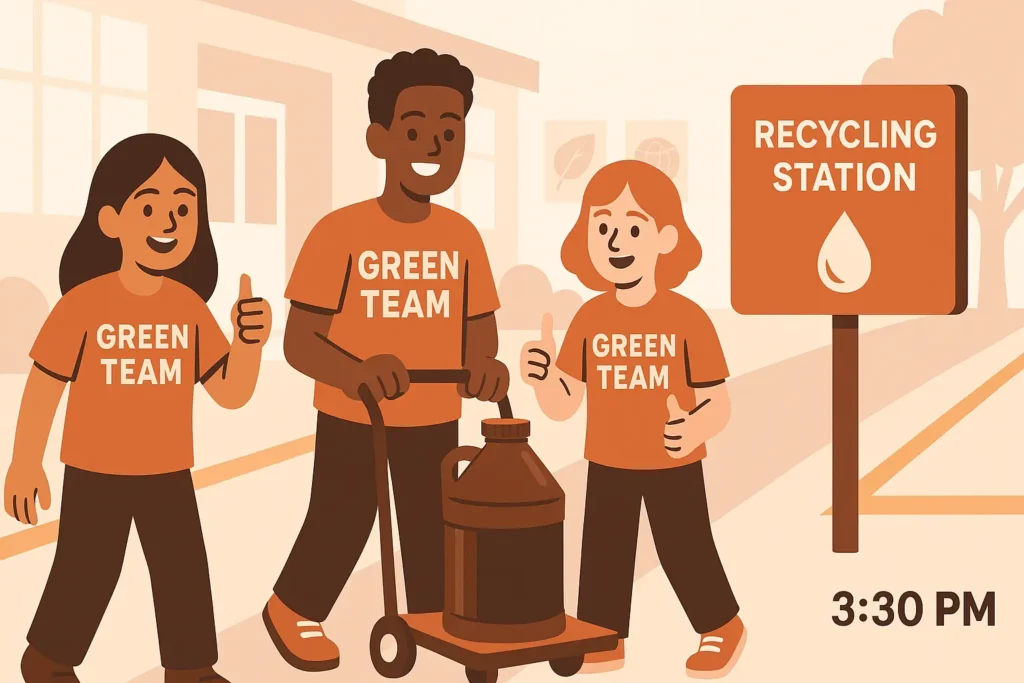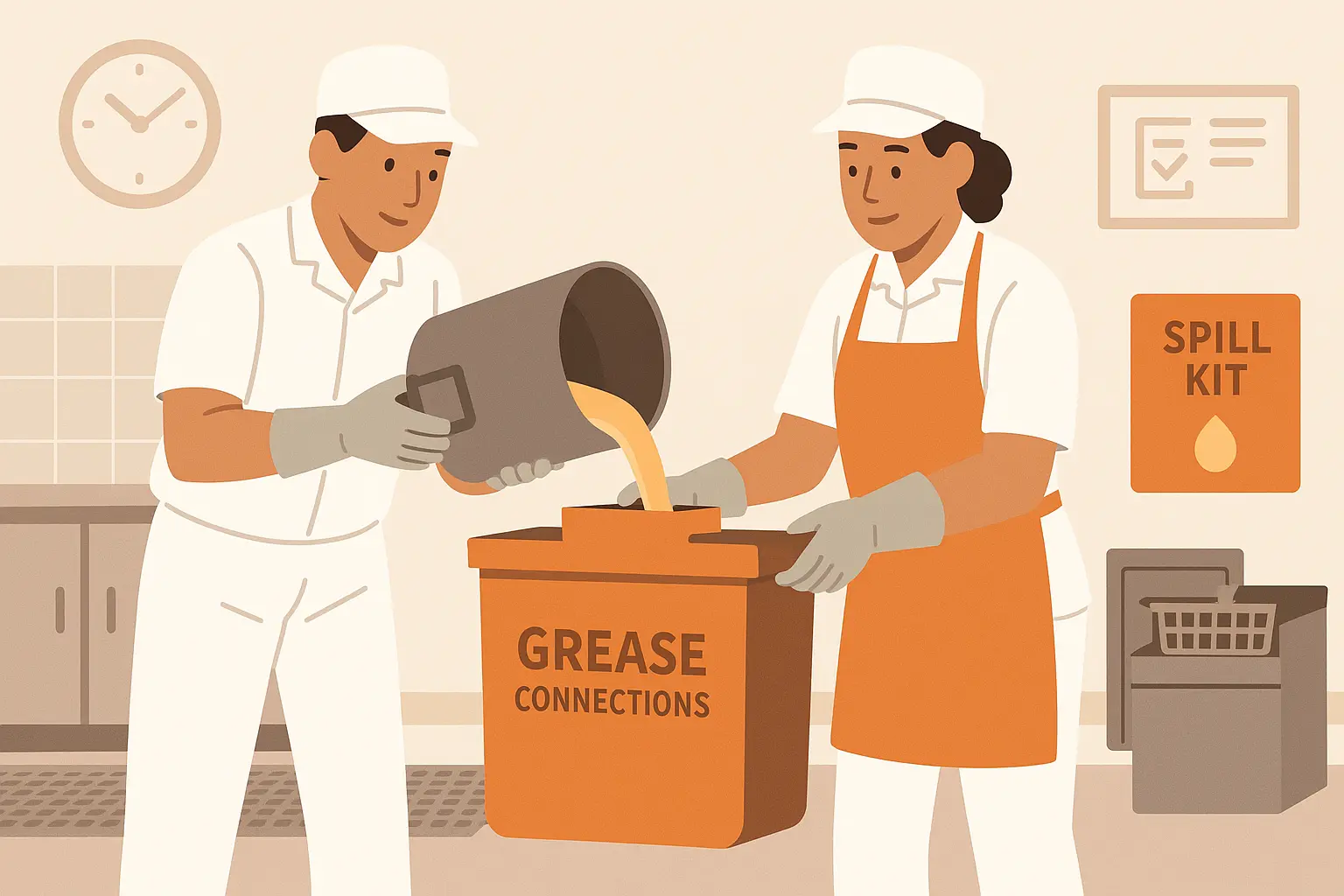Table of Contents
Why Grease Management Matters in New Jersey Schools
New Jersey cafeterias serve thousands of meals a day, which can release fats, oils, and grease (FOG) that clog pipes, trigger costly fines, and pollute local waterways. State code requires every institutional kitchen to size grease traps by meal volume and never below 750 gallons.
Local sewer authorities add steep penalties up to $50,000 per day for unreported discharges. NJDEP’s food waste guidance ranks industrial uses such as biofuel ahead of landfill disposal, making used oil recycling both a compliance and sustainability win. Grease Connections advises schools that proactive programs cut plumbing call outs by 60 percent on average and strengthen grant bids for green upgrades.
The NJ School Cafeteria Grease Checklist
The checklist below distills state regulations, inspection trends, and Grease Connections field data into a single routine that food service teams can follow without jargon.
| Task | Frequency | Proof to Keep (Years) | NJ Rule |
|---|---|---|---|
| Skim fryer oil & strain crumbs | Daily | Log sheet (3) | Chapter 24 Food Code |
| Empty hydromechanical trap basket | Weekly | Photo in log (3) | Local FOG ordinances |
| Pump gravity grease trap (>750 gal) | 30 days or 25 % full | Manifest form (3) | N.J.A.C. 7:9A |
| Inspect spill kit seals | Monthly | Initialed checklist (1) | NJ HACCP SOP |
Following this “3 3 30” record rule (three forms, three years, 30 day check) satisfies most county inspectors and keeps the manifest binder school administrators need close at hand.
Fryer Oil Disposal Rules for Schools
Used cooking oil is classified as a recyclable commodity, not solid waste, when it is collected for biofuel production. Schools must:
- Store oil in labeled, lidded tanks outside of food prep zones.
- Use a licensed “used collection company” listed on the state transporter registry to haul it.
- Attach the signed NJ grease manifest to the cafeteria’s binder for three years.
Many districts earn rebates that offset kitchen costs when volume tops 200 gallons per month. Grease Connections provides sealed tanks with integrated level sensors so custodians call for pickup only when needed, eliminating spill risks.
Cafeteria FOG Rules, Explained
Statewide FOG oversight falls under county sewer utilities that enforce N.J.A.C. 7:9A size and maintenance rules, plus local ordinances such as Somerville’s 180 day retrofit deadline for older kitchens. Schools must submit plumbing plans for review within 30 days of any kitchen renovation. Failure to produce cleaning records during spot checks is cited as the #1 violation by Passaic Valley Sewerage Commission inspectors.

Kitchen Staff Grease Training NJ
NJ’s Integrated Pest Management (IPM) manual assigns the School IPM Coordinator to train kitchen staff on sanitation and grease control when hired and annually thereafter. Recommended modules include trap anatomy, manifest signatures, and grease fire response using Class K extinguishers skills that lower insurance premiums by up to 15 percent. Training sign in sheets attach to the HACCP file, creating an easy audit trail for health inspectors.
Setting a School Grease Trap Schedule
Grease trap pumping hinges on meal count and trap size. N.J.A.C. 7:9A’s equation (Meals × 11.25 × Loading Factor) predicts capacity needs; once the trap reaches 25 percent FOG, it must be pumped. Grease Connections advises pairing sensor alerts with the monthly kitchen calendar so staff can see upcoming pump dates at a glance an approach that cut emergency overflows 42 percent last school year.
Funding Grease Recycling: Grants & Used Oil Fundraisers
NJEA funded Sustainable Jersey for Schools grants award up to $10,000 for waste reduction tech, including automated oil tanks. Bergen County’s Environmental Awareness Challenge offers mini grants of $1,000 for K 12 recycling ideas. Schools can also run “liquid gold” used oil fundraiser drives one PTA raised $15,000 for a biodiesel processor.
| Funding Source | Typical Award | Eligible Projects |
|---|---|---|
| Sustainable Jersey NJEA Grant | $10 k | Smart traps, training videos |
| BCUA Challenge Grant | $1 k | Recycling bins, student signs |
| PTA Liquid Gold Drive | Variable | Biodiesel processor |
Student Green Team Oil Program
Student “green teams” earn certification points by tracking oil collections and designing peer education posters. Table to Table’s I Rescue Lunch app gamifies waste audits and fits neatly into STEM curricula. One New Jersey middle school cut cafeteria waste 35 percent after adding weekly oil volume graphs to morning announcements, turning compliance into a student led habit.

The Manifest Binder: Records That Pass Inspection
Every pickup must generate a four part NJ grease manifest signed by the cafeteria manager and the used collection company. Keep forms chronologically in a labeled binder near the kitchen office; inspectors look for:
- Complete transporter ID numbers (cross checked against the state list).
- Volume totals matching tank gauge readings.
- Three full years of records; older manifests may be archived digitally under EPA e Manifest guidelines.
Crafting a Cafeteria Spill Plan
NJ’s SPCC rules require food facilities storing oil to keep a written spill prevention and counter measure plan on site. A compliant plan identifies floor drain covers, absorbent locations, and a 24 hour emergency phone tree. For schools, Grease Connections recommends adding clear student evacuation cues and an annual drill during Fire Prevention Week, aligned with NJDOH emergency planning guidance.
Grease Connections Advice & Next Steps
Grease Connections advises pairing this NJ School Cafeteria Grease Checklist with your district’s New Jersey school cafeteria guidelines to streamline audits. Ready for a hands on walk through or a fryer oil disposal school rebate quote? Contact our New Jersey team today because clean kitchens and clear pipes keep lunch lines moving.









